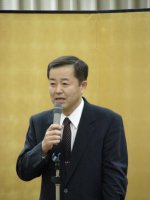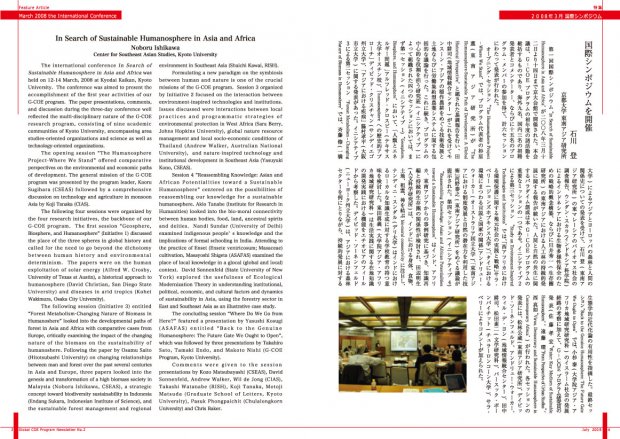"In Search of Sustainable Humanosphere in Asia and Africa: The First International Conference"
Date:March 12-14,2008
Venue:Kyodai Kaikan 101 Room (http://www.kyodaikaikan.jp/) , map>>
Registration >>
Thank you vey much for your registration. Unfortunately the registration has been closed now. With regard to International Conference, please come to Kyodai Kaikan directly in 12 March, 2008. The registration will start from 9:30 AM.
Mission Statement
The Global COE Program will hold the first Kyoto international conference on sustainable humanosphere from the 12th to the 14th of March at Kyoto University.
The conference is designed to summarize the academic progress of our Program since its inception last July, and to engage in discussion with invited scholars from various disciplines, to take stock of current state of our knowledge and identify avenues for further research.
So far we have concentrated our efforts on setting up the organizational structure, appointing researchers, distributing research grants, and holding seminars and conferences at home and abroad. By April we will have appointed nine G-COE assistant professors and postdoctoral researchers, and will have held seven international workshops, including those in Indonesia, Thailand, Ethiopia and the U.K., and more than forty seminars at home.
Emerging is a sense of an intellectual community which shares the purpose and vocabulary: in particular, we have been discussing the issue of how to combine humanosphere science research with a broader interest in institutions, politics, economics, history and culture in the context of area studies. Global environmental issues are important part of this, but we are developing a specifically area studies based perspective, by bringing in factors specific to tropics, and by relativizing the prevailing views and discourses, which are often formulated on the historical experiences of the "developed world" in the temperate zones. We are implementing a joint research, at a fieldwork site of Indonesia, which is intended to contribute to the development of humanosphere-sustainable technologies and the institutions that accompany them.
In this conference we will invite approximately ten scholars from abroad, to hear their own views and to receive comments on our perspectives. We will also present the initial outcome of our own research and, more importantly, the research agenda, which we intend to undertake during the next four years.
The four main sessions will be organized primarily by conveners of the four research initiatives of the Program. The conference as a whole will be convened by Professor Noboru Ishikawa, chairman of the organizing committee.
Kaoru Sugihara
Convener, Global COE Program
Kyoto University
Downloads: Program ![]() (2008/03/11UP)
(2008/03/11UP)
| Day 1: March 12th | |
| 9:30~10:00 | Registration |
| 10::00~10:10 | Opening Remarks Kosuke Mizuno (Director, Center for Southeast Asian Studies, (CSEAS), Kyoto University) |
| Opening Session: The Humanosphere Project – Where We Stand Chairperson: Yoshiharu Omura (Research Institute for Sustainable Humanosphere, Kyoto University) |
|
| 10:10~10:40 |
“The Humanosphere-sustainable Path of Development: |
| 10:40~11:10 | “Land and Labor Intensive Agricultural Systems in Monsoon Asia: Comparative Perspectives on the Technological Development in Wet-Rice-Based Farming in Early Modern and Modern Periods” Koji Tanaka (Center for Integrated Area Studies (CIAS), Kyoto University) |
| 11:10~12:10 | Discussion including comments by Chris Baker |
| 12:10~13:40 | Lunch |
| Session 1: Geosphere, Biosphere & Humanosphere Chairperson: Naoto Kagotani (Institute for Research in Humanities, Kyoto University) |
|
| 13:40~14:10 | “Energy, Humanity’s Greatest Addiction” Alfred Crosby (The University of Texas at Austin) |
| 14:10~14:40 | “Towards a history of the Humanosphere” David Christian (San Diego University) |
| 14:40~15:10 | “Health Hazards in 19th Century India: Cholera and Malaria Epidemics in Semi-Arid Tropics” Kohei Wakimura (Osaka City University) |
| 15:10~15:25 | Coffee Break |
| 15:25~16:45 | Discussion including comments by: Kozo Matsubayashi (CSEAS, Kyoto University) David A. Sonnenfeld (State University of New York) |
| 18:00~ | Reception (Shiran Kaikan) |
| Day 2: March 13th | |
| Session 2: Forest metabolism - Changing Nature of Biomass in Humanosphere Chairperson: Takahisa Hayashi (RISH, Kyoto University) |
|
| 9:00~9:30 | “Contrasting Stories: Population and Forests, East Asia and Europe, Traditional and Modern” Osamu Saito (Hitotsubashi University) |
| 9:30~10:00 | “Biomass Society in the Tropics: Genesis and Metamorphoses” Noboru Ishikawa (CSEAS, Kyoto University) |
| 10:00~10:30 | “Biosphere Reserve - A Strategic Concept Toward Sustainable Development, Indonesian Case Study” Endang Sukara (Indonesian Institute of Sciences (LIPI)) |
| 10:30~11:00 | “Sustainable Forest Management and Regional Environment in South-East Asia” Shuichi Kawai (RISH, Kyoto University) |
| 11:00~11:15 | Coffee Break |
| 11:15~12:35 | Discussion including comments by: Andrew Walker (Australian National University) Wil A. de Jong (CIAS, Kyoto University) |
| 12:35~14:15 | Lunch |
| Session 3: Environment-inspired Technologies and Institutions in the Tropics Chairperson: Masayuki Yanagisawa (CIAS, Kyoto University) |
|
| 14:15~14:45 | “What role for West Africa’s trees?” Sara Berry (Johns Hopkins University) |
| 14:45~15:15 | “Global Nature Resource Management and Local Socio-Economics Conditions” Andrew Walker (Australian National University) |
| 15:15~15:45 | “What are nature-inspired Technologies and Institutions?” Yasuyuki Kono (CSEAS, Kyoto University) |
| 15:45~16:00 | Coffee Break |
| 16:00~17:20 | Discussion including comments by: Takashi Watanabe (RISH, Kyoto University) Koji Tanaka (CIAS, Kyoto University) |
| Day 3: March 14th | |
| Session 4: Reassembling Knowledges - Asian and African Potentialities towards Sustainable Humanosphere Chairperson: Yoko Hayami (CSEAS, Kyoto University) |
|
| 9:00~9:30 | “Cultural Politics of Life:Vernacular Democracy and Possibilities for Humanosphere-sustainable Development in Contemporary Rural Orissa, India” Akio Tanabe (Institute for Research in Humanities, Kyoto University) |
| 9:30~10:00 | “Indigenous People's knowledge in India: the implications of formal schooling” Nandini Sundar (University of Delhi) |
| 10:00~10:30 | “Local Knowledge for Positive Practice: How ensete (Ensete ventricosum) farmer's varieties are conserved in Ethiopia? ” Masayoshi Shigeta (ASAFAS, Kyoto University) |
| 10:30~11:00 | “Ecological Modernization and Sustainability in the Forestry Sector in Asia” David A. Sonnenfeld (State University of New York) |
| 11:00~11:15 | Coffee Break |
| 11:15~12:35 | Discussion including comments by: Akira Adachi (ASAFAS, Kyoto University) Motoji Matsuda (Graduate School of Letters, Kyoto University) |
| 12:35~14:15 | Lunch |
| Session 5: Where Do We Go from Here? Chairperson: Kaoru Sugihara |
|
| 14:15~14:35 | “Back to the Genuine Humanosphere – The Future Gate We Ought to Open” Yasushi Kosugi (ASAFAS, Kyoto University) |
| 14:35~15:15 | General discussion led by the chair, including short presentations by: Takahiro Sato (GCOE Program, Kyoto University) Tamaki Endo (GCOE Program, Kyoto University) Makoto Nishi (GCOE Program, Kyoto University) |
| 15:15~15:30 | Coffee Break |
| 15:30~16:50 | General discussion including comments Pasuk Phongpaichit (Chulalongkorn University) |
| 16:50~17:00 | Closing Remarks: Noboru Ishikawa(Chairperson, Organizing Committee) |
| Other participants: | |
| Pasuk Phongpaichit Mamoru Yamamoto (RISH, Kyoto Uniersity) Hiroyuki Yano (RISH, Kyoto Uniersity) Koichi Fujita (CSEAS, Kyoto University) Masaaki Okamoto (CSEAS, Kyoto University) Fumikazu Ubukata (GCOE Program, Kyoto University) Shuhei Kimura (GCOE Program, Kyoto University) Osamu Kozan (GCOE Program, Kyoto University) Tamaki Endo (GCOE Program, Kyoto University) Makoto Nishi (GCOE Program, Kyoto University) Takahiro Sato (GCOE Program, Kyoto University) Taizo Wada (GCOE Program, Kyoto University) Sun Xiaogang (GCOE Program, Kyoto University) Motoko Fujita (GCOE Program, Kyoto University) Shoko Kobayashi (GCOE Program, Kyoto University) |
|
The First International Conference was held at Kyodai Kaikan on March 12-14, 2008. ISHIKAWA Noboru was appointed organizing committee chairperson and the event was a literally all-out effort by the program using almost the full amount allocated to the meeting expenses for “paradigm formulation”. The Conference consisted of a general session and five sessions focusing specifically on paradigm formulation, history, ecology, forest/biomass society and local knowledge. There were 16 presentations, seven delivered by core members of the project. Though originally envisaged on a small scale, to allow participants to engage in substantive debates, in fact about 120 people participated, including graduate students and junior researchers.
The general way of thinking which directed the discussion can be summarized as follows: On the one hand, stimulated by the issue of global warming, area studies specialists must deepen their understanding of, and responses to, creating a sustainable environment, taking into account various points of debate such as the stabilization of the geosphere and biodiversity in the biosphere. At the same time, we cannot simply stop population growth and efforts to improve the standard of living of the poor, which makes human intervention and change in nature even more inevitable. It is thus necessary to develop technologies and institutions to underpin a sustainable environment by embracing both of these concerns and through interdisciplinary studies of a broadest possible kind.
Discussion at the conference demonstrated a strong awareness that this is not a matter of the transfer of developed countries’ technologies and institutions, but rather that technologies and institutions should be developed fully taking note of the characteristics of tropical environments, as well as what actors are required for their implementation. In the session on forest/biomass society, the foci of papers ranged from the necessity of reforestation using high technology to problems caused by it. Historical and social implications were also discussed. At the level of analysis of actual practice, problems arising from attitudes and values on the part of local people occupied central attention.
The presentations by invited speakers Alfred Crosby, David Christian, WAKIMURA Kouhei, SAITO Osamu, Endang Sukara, Sara Berry, Andrew Walker, Nandini Sunder and David Sonnenfeld contained a wealth of wisdom and suggestions for the issues discussed at the conference. The full commentary offered by Chris Baker and Pasuk Phongpaichit, who were invited to Japan in connection with another project of the Center for Southeast Asian Studies, as well as the three short presentations from COE researchers at the general session, made us aware of the vast potential contributions of the program.
(Kaoru Sugihara)

